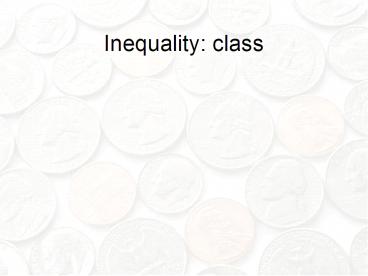Inequality: class PowerPoint PPT Presentation
1 / 21
Title: Inequality: class
1
Inequality class
2
Framing the problem
- Why (or when) is class inequality a social
problem?
3
Critical constructionism
- Constructionism significant group frames the
problem - Who is defining the problem?
- How do they frame it?
- Critical values equality
- Critical of social formation (elite interests)
- Critical of media frames
4
Alternative social models (based on Heiner, 24)
Socialism Public ownership Social needs Govt
plan
Capitalism Private ownership Private profit No
govt regs
Social Democracy Mixed model
5
Political spectrum acc. Heiner(rev. by Shafer)
Left Socialist Big Government
Democratic Socialism
Right Capitalist Big Corporations
U.S. Dems
U.S. Reps
Classic socialism rights of equality, society
Classic liberalism rights of individual, property
6
If this is a class conflict, who is winning?
7
Social stratification
- Structured inequality in terms of access to
material or symbolic rewards
8
Stratification in U.S. income (Heiner, p. 27)
- 1977-1994 after tax income
- Dropped 16 for bottom 20
- Increased 25 for top 20
- Increased 72 for top 1
- Richest 1/5 have 11 times income share of poorest
fifth in 1996 (7.6 times in 1970) - most rapid growth of income inequality in the
Western world. (Wilson)
9
(No Transcript)
10
Numbers of households in each income range
11
2003 income distribution
- Percent Distribution of Households, by Selected
Characteristics Within Income Quintile and Top 5
Percent in 2003 - http//pubdb3.census.gov/macro/032004/hhinc/new05_
000.htm
12
Wealth even more unequal
- Wealth generates more income for top 1 than
salary - Top 1
- 19 of all wealth in 1976
- 40 in 2000
- Wealth inheritance affects mobility
13
Case study Empire of the Pigs
- Role of power elite?
- Breskys low profile, not participants in
policy formation networks - Compensation not that highfrom public corp., at
least - But corporate welfare in millions (Barlett
Steele) - Local C of Cs build infrastructure, give tax
relief - State also kicks in tax relief
- Lenient treatment in the courts, regulatory
agencies - Low wage workforce adds to welfare burden
14
Cross-national comparison
- Why do Europe, Japan have less inequality?
- Social democratic policies offer more social
benefits, protection against hard times
15
Poverty
- Absolute poverty cant afford bare necessities
threat to life and well-being - Relative poverty cant afford normal standard
of living poor compared to others
16
The poverty line
- Formula originated in 1960s, based on 50s data
- 3X the thrifty food plan (e.g., hamburger
helper, not cheeseburger) - Relative cost of necessities has changed poverty
line underestimates
17
census poverty chart
Source http//www.census.gov/hhes/www/img/incpov0
3/fig06.jpg
18
Job ghetto
- William Julius Wilson discovered connections
- between decline of manufacturing and loss of jobs
in inner cities - between joblessness and other social problems
- Newman and Lennon confirm this theory in Harlem
- Manufacturing surpassed by fast food
- People seek jobs applicant/hires14/1
- African-Americans at disadvantage
- These are minimum wage jobs, below poverty line
- it is simply not the case that anyone who wants
a low wage job can get one. (88)
19
Wal-Martization
- Wal-Mart wages (Cox)
- A single parent employed full-time at Salinas
Wal-Mart and raising two children aged 4 and 12
does not earn enough money to supply the familys
basic needs by shopping atWal-Mart. (Cox 90) - Welfare programs (child care, food stamps,
Medicaid, EITC) subsidize the low wages, get just
above poverty line - Wal-Mart encouraged workers to apply
- Wal-Mart consumers (Featherstone)
- Waltons real genius how to make money off of
poverty (102) - Consumer identity displaces worker and citizen
- Solution must be engaged citizens, put political
pressure
20
Poverty in the burbs
- 2004 38.5 of poor in burbs, Cf. 40.6 in inner
cities (Dreier 110) - Concentrated in inner-rings and fringe (small
towns swallowed up) - 2005 suburban poverty exceeds urban (Brookings
Institution)
21
What are the consequences?
- Braun
- Social disorganization
- Anomie
- Crime
- Violence
- Revolution?

